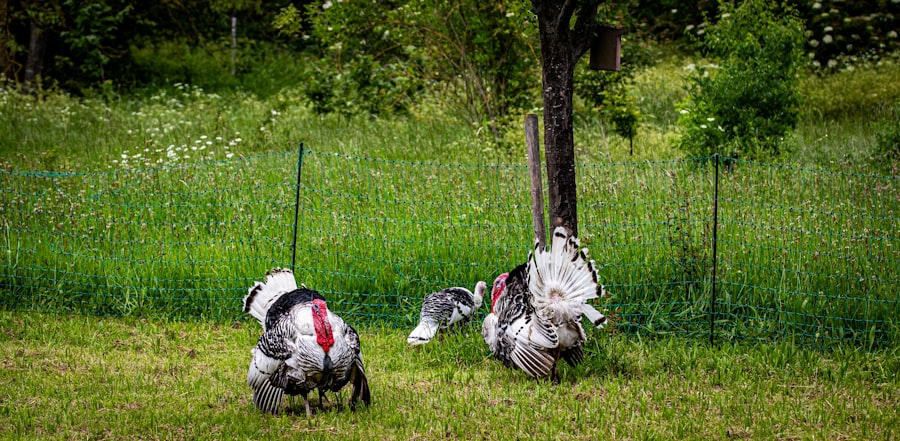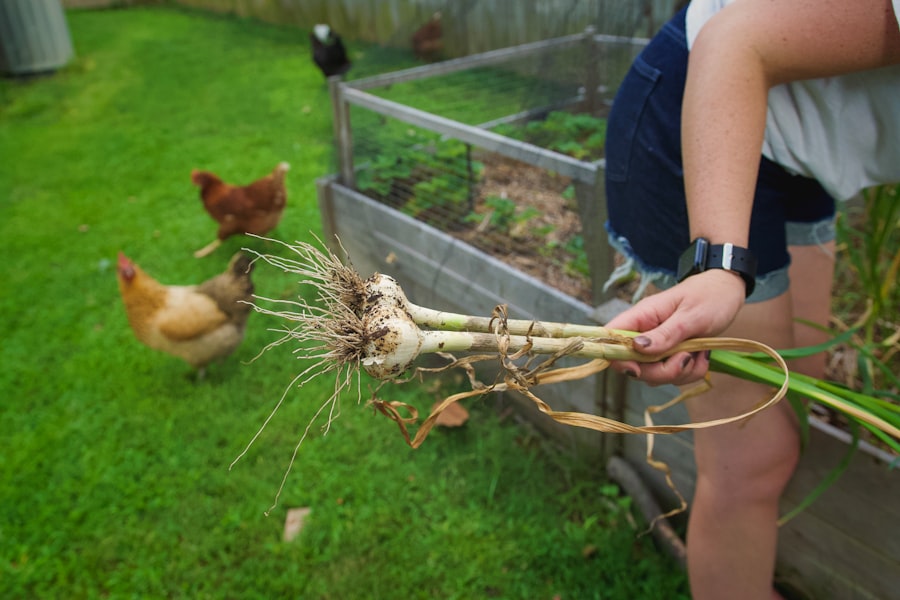Keeping chickens in residential yards offers numerous advantages for households. One primary benefit is the production of fresh, organic eggs, which are both nutritious and flavorful. This provides a sense of self-sufficiency and food security.
Chickens also contribute to natural pest control by consuming insects and other small pests in the yard. Their manure serves as an excellent organic fertilizer, enhancing soil quality for gardening purposes. Chickens can be engaging pets, displaying unique behaviors and personalities that provide entertainment and companionship.
They offer educational opportunities for children, teaching responsibility and providing insight into food production and animal husbandry. Backyard chickens can significantly reduce household food waste by consuming kitchen scraps such as vegetable peelings and stale bread. This practice contributes to a more sustainable lifestyle by diverting organic matter from landfills.
Additionally, chickens assist in weed control through their natural scratching and foraging behaviors, potentially reducing the need for manual weeding or herbicides. The presence of chickens can create a tranquil atmosphere in outdoor spaces, with their soft vocalizations adding to the ambiance of a home environment. Overall, keeping chickens in residential yards can enhance sustainability, provide fresh food, and offer a unique and rewarding experience for homeowners.
Table of Contents
- 1 Understanding the Local Regulations and Zoning Laws
- 2 Choosing the Right Breeds for Your Environment
- 3 Creating a Safe and Comfortable Coop and Run
- 4 Feeding and Caring for Your Chickens
- 5 Dealing with Potential Challenges and Predators
- 6 Enjoying the Rewards of Fresh Eggs and Sustainable Living
- 7 FAQs
- 7.1 What are the regulations for keeping chickens in Columbia County, Georgia?
- 7.2 How many chickens are residents allowed to keep in their yard in Columbia County, Georgia?
- 7.3 What are the coop requirements for keeping chickens in Columbia County, Georgia?
- 7.4 Are there any distance requirements for keeping chickens in Columbia County, Georgia?
- 7.5 Are there any restrictions on roosters in Columbia County, Georgia?
Key Takeaways
- Keeping chickens in your yard can provide fresh eggs, natural pest control, and a connection to nature.
- Understanding local regulations and zoning laws is crucial before starting a backyard chicken operation to avoid potential fines or legal issues.
- Choosing the right chicken breeds for your environment, such as cold-hardy breeds for colder climates, is essential for their health and productivity.
- Creating a safe and comfortable coop and run with proper ventilation, predator-proofing, and adequate space is important for the well-being of your chickens.
- Feeding and caring for your chickens with a balanced diet, clean water, and regular health checks will ensure their optimal health and egg production.
- Dealing with potential challenges and predators, such as disease, pests, and neighborhood animals, requires proactive measures to protect your flock.
- Enjoying the rewards of fresh eggs and sustainable living, as well as the joy of raising chickens as pets, can be fulfilling and rewarding.
Understanding the Local Regulations and Zoning Laws
Researching Local Regulations
It’s essential to research and understand these regulations to ensure that you are in compliance with the law. Failure to do so can result in fines or conflicts with neighbors. Take the time to review your local ordinances and zoning laws to ensure a smooth transition to keeping chickens in your yard.
Homeowners’ Association Rules
In addition to local regulations, it’s also important to consider any homeowners’ association rules that may apply to your property. Some HOAs have strict guidelines regarding the keeping of livestock, including chickens. Review these rules and seek approval from the HOA if necessary before bringing chickens onto your property.
Avoiding Potential Issues
By understanding and adhering to local regulations and zoning laws, you can avoid potential fines or conflicts with neighbors and ensure a smooth and legal transition to keeping chickens in your yard. Take the time to do your research and ensure that you are in compliance with all applicable laws and regulations.
Choosing the Right Breeds for Your Environment

When it comes to choosing the right breeds for your environment, there are several factors to consider. First, you’ll want to think about the climate in your area. Some chicken breeds are better suited to cold climates, while others thrive in warmer environments.
It’s important to select breeds that can tolerate the temperature fluctuations and weather conditions in your region. Additionally, consider the space available in your yard and the temperament of the breeds you are considering. Some breeds are more docile and friendly, making them suitable for families with children, while others may be more skittish or aggressive.
Furthermore, consider the purpose for keeping chickens in your yard. If you are primarily interested in egg production, there are breeds known for their high egg-laying capabilities. If you are interested in meat production, there are breeds that are specifically bred for their meat quality.
It’s important to research different breeds and their characteristics to determine which ones align with your goals and environment. By choosing the right breeds for your environment, you can ensure that your chickens thrive and provide the benefits you are seeking.
Creating a Safe and Comfortable Coop and Run
Creating a safe and comfortable coop and run is essential for the well-being of your chickens. The coop should provide protection from predators, shelter from the elements, and adequate space for roosting and nesting. It’s important to use high-quality materials that are durable and weather-resistant when building or purchasing a coop.
Additionally, ensure that the coop is well-ventilated to prevent moisture buildup and maintain good air quality for the chickens. The run should provide ample space for the chickens to roam and exercise while keeping them contained and safe from predators. Consider using hardware cloth or welded wire fencing to secure the run and prevent entry from digging predators.
Provide enrichment such as perches, dust baths, and toys to keep the chickens entertained and active. Additionally, consider landscaping the run with vegetation to provide shade, foraging opportunities, and natural hiding spots for the chickens. By creating a safe and comfortable coop and run, you can ensure that your chickens are happy, healthy, and secure in their environment.
Feeding and Caring for Your Chickens
Feeding and caring for your chickens is an important aspect of keeping them healthy and productive. A balanced diet is essential for egg production, so it’s important to provide a high-quality commercial feed that is formulated for laying hens. Additionally, supplement their diet with kitchen scraps, grains, fruits, vegetables, and protein sources such as mealworms or black soldier fly larvae.
Provide access to clean water at all times and ensure that feeders are kept clean and free from mold or contamination. In addition to feeding, regular care and maintenance are necessary for keeping chickens healthy. This includes cleaning the coop regularly to prevent disease and parasites, monitoring for signs of illness or injury, and providing appropriate veterinary care when needed.
Additionally, consider implementing a regular dust bathing area for the chickens to help control parasites such as mites or lice. By providing proper nutrition and care for your chickens, you can ensure that they remain healthy, happy, and productive.
Dealing with Potential Challenges and Predators

Common Predators and Threats
Keeping chickens in your yard can come with potential challenges, including predators that pose a threat to their safety. Common predators include raccoons, foxes, hawks, owls, snakes, and domestic pets.
Securing the Coop and Run
It’s essential to take proactive measures to protect your chickens from these threats by securing the coop and run with predator-proof fencing, locks, and hardware cloth.
Deterrents and Vigilance
Consider installing motion-activated lights or sound devices to deter nocturnal predators. Additionally, consider using deterrents such as predator decoys or natural repellents to discourage predators from approaching the coop and run. Regularly inspect the perimeter for signs of digging or entry points that predators may exploit.
By being vigilant and proactive in addressing potential challenges and predators, you can help ensure the safety and well-being of your chickens.
Enjoying the Rewards of Fresh Eggs and Sustainable Living
One of the most rewarding aspects of keeping chickens in your yard is the access to fresh eggs that are nutritious, delicious, and free from harmful chemicals or additives. Fresh eggs have vibrant yolks, rich flavor, and superior nutritional value compared to store-bought eggs. Additionally, keeping chickens contributes to sustainable living by reducing food waste through composting kitchen scraps, providing natural pest control in your yard or garden, and producing high-quality fertilizer for soil enrichment.
Furthermore, keeping chickens can foster a deeper connection to nature and food production by understanding where our food comes from and the care involved in raising animals for sustenance. It can also provide a sense of self-sufficiency and empowerment by taking control of our food sources and reducing reliance on industrialized agriculture. Overall, enjoying the rewards of fresh eggs and sustainable living through keeping chickens in your yard can bring a sense of fulfillment, connection to nature, and a more conscious way of living.
In conclusion, keeping chickens in your yard can provide a wide range of benefits including access to fresh eggs, pest control, reduction of food waste, entertainment, pet companionship, weed control, fertilizer production, educational opportunities for children, peaceful ambiance, sustainable living practices, connection to nature, self-sufficiency, empowerment, and a deeper understanding of food production. However, it’s important to understand local regulations and zoning laws related to keeping poultry before bringing chickens onto your property. When choosing breeds for your environment, consider climate tolerance, space availability, temperament, purpose (egg production or meat), research different breeds’ characteristics before making a decision.
Creating a safe coop & run involves using high-quality materials (durable & weather-resistant), ensuring proper ventilation & predator-proofing measures (hardware cloth or welded wire fencing), providing enrichment (perches & dust baths), landscaping (vegetation for shade & natural hiding spots). Feeding & caring for chickens involves providing balanced diet (commercial feed formulated for laying hens), supplementing diet with kitchen scraps & protein sources (mealworms or black soldier fly larvae), providing clean water at all times & regular care/maintenance (cleaning coop regularly & monitoring signs of illness/injury). Dealing with potential challenges & predators involves securing coop & run with predator-proof fencing/locks/hardware cloth & using deterrents (motion-activated lights/sound devices/predator decoys/natural repellents) while being vigilant & proactive in addressing potential threats.
Enjoying rewards of fresh eggs & sustainable living involves access to nutritious/delicious/chemical-free eggs (vibrant yolks/rich flavor/superior nutritional value), contributing to sustainable living (reducing food waste/providing natural pest control/producing high-quality fertilizer), fostering deeper connection to nature/food production (understanding where our food comes from/care involved in raising animals), providing sense of self-sufficiency/empowerment (taking control of our food sources/reducing reliance on industrialized agriculture), bringing sense of fulfillment/connection to nature/more conscious way of living through keeping chickens in our yard
If you’re considering keeping chickens in your yard in Columbia County, Georgia, you may also want to think about what kind of coop is best for them. This article provides helpful information on the different types of coops available and what might work best for your specific situation. It’s important to provide a safe and comfortable environment for your chickens, so doing your research on coop options is essential.
FAQs
What are the regulations for keeping chickens in Columbia County, Georgia?
In Columbia County, Georgia, residents are allowed to keep chickens in their yards as long as they adhere to the county’s regulations. These regulations typically include guidelines on the number of chickens allowed, coop requirements, and distance from neighboring properties.
How many chickens are residents allowed to keep in their yard in Columbia County, Georgia?
The specific number of chickens allowed in a yard in Columbia County, Georgia may vary, but it is common for regulations to limit the number to a certain amount, such as 6 or 8 chickens.
What are the coop requirements for keeping chickens in Columbia County, Georgia?
Columbia County, Georgia typically has specific requirements for chicken coops, including guidelines for size, construction materials, and cleanliness. Coops are often required to provide adequate space for the chickens and protection from predators.
Are there any distance requirements for keeping chickens in Columbia County, Georgia?
Some regulations in Columbia County, Georgia may include distance requirements for chicken coops from neighboring properties. This is to ensure that the chickens do not cause disturbances to nearby residents.
Are there any restrictions on roosters in Columbia County, Georgia?
Some areas in Columbia County, Georgia may have restrictions on keeping roosters due to noise concerns. Residents should check the specific regulations in their area to determine if roosters are allowed.
Meet Walter, the feathered-friend fanatic of Florida! Nestled in the sunshine state, Walter struts through life with his feathered companions, clucking his way to happiness. With a coop that’s fancier than a five-star hotel, he’s the Don Juan of the chicken world. When he’s not teaching his hens to do the cha-cha, you’ll find him in a heated debate with his prized rooster, Sir Clucks-a-Lot. Walter’s poultry passion is no yolk; he’s the sunny-side-up guy you never knew you needed in your flock of friends!







